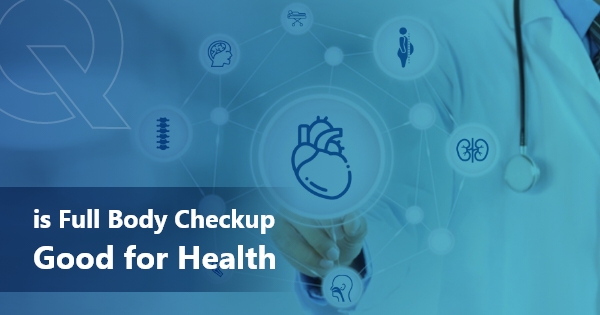In an era where preventive healthcare is gaining prominence, the concept of a full body checkup has become increasingly popular. This comprehensive health assessment aims to proactively identify potential health risks, allowing for early intervention and the promotion of overall well-being. This article explores the merits and considerations of undergoing a full body checkup, shedding light on its potential benefits and limitations.
I. The Essence of a Full Body Checkup
A. What is a Full Body Checkup?
A full body checkup, also known as a comprehensive health screening, involves a series of medical tests and examinations designed to assess the overall state of an individual’s health. It encompasses a wide range of assessments, including blood tests, imaging studies, and physical examinations, with the goal of detecting early signs of diseases and evaluating key health indicators.
B. Components of a Full Body Checkup
1. Blood Tests: These encompass a battery of tests to evaluate various aspects of health, including cholesterol levels, blood sugar levels, liver function, kidney function, and markers for inflammation and infection.
2. Imaging Studies: This may include X-rays, ultrasounds, and in some cases, advanced techniques like MRI or CT scans. These studies provide detailed insights into the internal structures of the body.
3. Physical Examinations: A thorough examination by a healthcare professional may include assessments of vital signs, cardiovascular health, respiratory function, and neurological well-being.
4. Lifestyle and Medical History Assessment: Understanding an individual’s lifestyle habits, family history, and previous medical conditions provides essential context for interpreting test results.
II. Early Detection of Silent Threats
A. Identifying Silent Diseases
Many serious health conditions, including diabetes, hypertension, and certain types of cancer, can develop silently, showing no obvious symptoms in their early stages. A full body checkup can reveal these potential threats, allowing for timely intervention and management.
B. Cardiovascular Health
Cardiovascular diseases, which include heart disease and stroke, are leading causes of mortality worldwide. A full body checkup can assess key indicators like blood pressure, cholesterol levels, and blood sugar levels, providing crucial insights into cardiovascular health.
C. Cancer Screening
Early detection is often the key to successful cancer treatment. Various tests within a full body checkup, such as mammograms, Pap smears, and prostate-specific antigen (PSA) tests, are specifically designed to identify early signs of cancer.
III. Customized Health Plans
A. Tailored Recommendations
Based on the results of a full body checkup, healthcare providers can offer personalized recommendations for lifestyle changes, preventive measures, and targeted interventions. This customized approach addresses specific health concerns, promoting better outcomes.
B. Disease Prevention Strategies
Armed with the knowledge gained from a full body checkup, individuals can take proactive steps to reduce their risk of developing certain conditions. This may include adopting a balanced diet, engaging in regular exercise, and making necessary adjustments to their lifestyle.
IV. Peace of Mind and Reduced Health Anxiety
A. Alleviating Health Concerns
For many individuals, periodic full body checkups offer peace of mind. Knowing that one has undergone a thorough assessment provides a sense of assurance and can help alleviate anxiety related to potential health issues.
B. Empowerment through Knowledge
Understanding one’s health status empowers individuals to take control of their own well-being. It encourages a proactive attitude towards health and fosters a sense of responsibility for one’s own lifestyle choices.
V. Considerations and Limitations
A. Cost Considerations
While full body checkups offer a comprehensive view of health, they can be associated with a significant financial investment. It’s important to weigh the potential benefits against the cost, considering factors such as individual health history, age, and lifestyle.
B. Avoidance of Over-testing
Not all individuals may require the same battery of tests within a full body checkup. It’s crucial for healthcare providers to tailor the assessments to each individual’s specific health needs, avoiding unnecessary testing.
VI. The Importance of Regular Follow-ups
A. Monitoring Health Trends
A single full body checkup provides a snapshot of an individual’s health at a specific point in time. Regular follow-up checkups allow for the monitoring of health trends over time, enabling early detection of changes or abnormalities.
B. Adapting to Changing Circumstances
As individuals age or experience changes in lifestyle, their health priorities may evolve. Regular checkups provide an opportunity for healthcare providers to adjust recommendations and interventions accordingly.
VII. Special Considerations for Different Life Stages
A. Full Body Checkups for Children and Adolescents
While young individuals may not face the same health concerns as adults, regular checkups play a crucial role in monitoring growth and development. These assessments can detect early signs of conditions like childhood obesity, developmental delays, and nutritional deficiencies.
B. Full Body Checkups for Adults
As individuals enter adulthood, the focus shifts towards identifying and managing common health issues such as high blood pressure, cholesterol levels, and metabolic disorders. Regular screenings for conditions like diabetes and certain cancers become increasingly important.
C. Full Body Checkups for Seniors
For older adults, full body checkups are vital in assessing age-related health concerns, including bone health, cognitive function, and chronic conditions like osteoporosis and dementia. These assessments aid in creating tailored healthcare plans to support healthy aging.
VIII. Health Empowerment through Education
A. Understanding Test Results
A full body checkup not only provides test results but also offers an opportunity for individuals to engage in a dialogue with their healthcare providers. Understanding the significance of these results empowers individuals to actively participate in their own healthcare decisions.
B. Health Literacy and Awareness
Engaging in regular full body checkups fosters health literacy, allowing individuals to make informed choices about their lifestyle, diet, and overall well-being. This awareness is a powerful tool in disease prevention and overall health promotion.
IX. Building a Holistic Approach to Health
A. Integrating Wellness Practices
Full body checkups can serve as a starting point for adopting a holistic approach to health. This includes integrating practices like stress management, balanced nutrition, regular exercise, and mindfulness into one’s lifestyle.
B. Mental and Emotional Well-being
While physical health is a crucial aspect, mental and emotional well-being is equally important. Full body checkups can also be an opportunity to discuss mental health concerns, ensuring a comprehensive approach to overall wellness.
CONCLUSION:
A full body checkup can be a valuable tool in the pursuit of good health. By proactively assessing key health indicators and identifying potential risks, individuals can take informed steps towards prevention and early intervention. However, it’s important to approach full body checkups with consideration of individual circumstances, including age, health history, and lifestyle. Ultimately, the decision to undergo a full body checkup should be guided by a collaborative effort between individuals and their healthcare providers, working towards the shared goal of optimal health and well-being.





